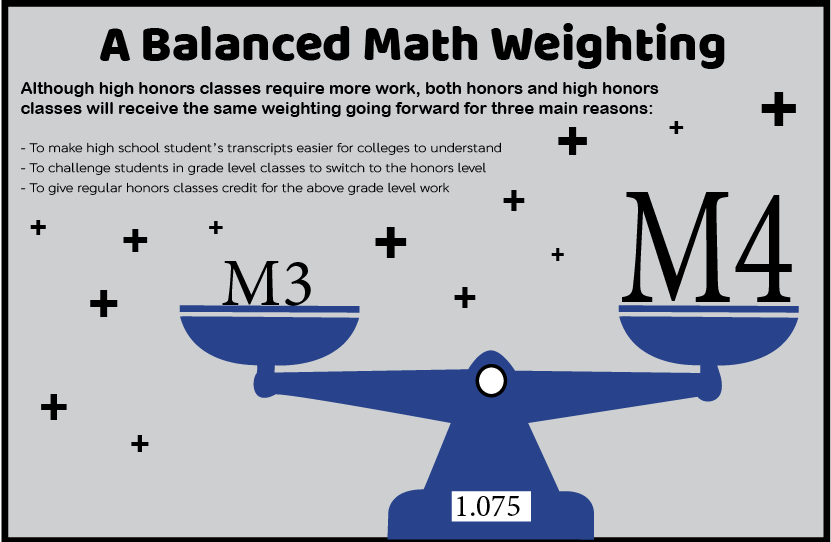Isabella Madrid, News Editor
Starting in the 2023-2024 school year students taking M3 math courses will receive an honors weighting on their grade point average (GPA). This credit adjustment will affect the weighted GPAs of current NCHS students who have been enrolled in M3 courses previously in order to standardize high school transcripts for college admissions, according to chair of the math department, Rebecca Pavia.
Ms. Pavia discussed a major motivation behind the change. “The feedback we were getting when [colleges]got our transcript was that they had to then go back to our school profile to figure out what the levels meant, which created an extra step,” she said.
She added that the math department had been moving towards the goal of standardizing high school transcripts for multiple years, which can be seen from last year’s additional notation of “accelerated” on M3 student transcripts.
Due to the volume of applications to colleges in recent years, the math department aimed to limit extra steps in order to have students be easily recognized for their difficult course load. “Because schools are getting so many applications, they don’t have the resources and the time to take that extra step, so we wanted to make sure that the work that our kids were doing was being reflected on their transcripts,” said Ms. Pavia.
Another key motivation for the change came from a comparison of the M3 math curriculum at the high school to honors math curriculums in nearby towns. “We also looked at curriculum of other schools, in our DERG (Demographic Reference Group) and our M3 curriculum really aligned to an honors level curriculum,” Ms. Pavia said.
Students have, for the most part, been in favor of the change. M3 student Sebastian Saridakis is in support of the change as he feels it is a well deserved GPA boost for taking an accelerated course. “I fully support and endorse the credit change to ‘honors’ as I feel we finally receive the representation and credit we deserve, after proactively choosing an accelerated course over the standard M2 grade level,” Sebastian said.
Junior Emilia Martinez has taken math courses both at the M3 and M4 level, and she asserts that a key difference between the two courses was in terms of the need to figure out difficult problems by yourself in an M4 course. “M4 is a lot faster paced and there is a lot more work that you need to be able to solve on your own, while M3 has a lot more assistance and caters more to people who need their teacher to help guide them in order to be successful in a math class,” said Emilia.
Junior Rohan Shenoy has taken exclusively M4 math classes all throughout his high school career and described his experience in M4 as intellectually rigorous. “M4 classes are fast paced and we go through material very quickly. I feel challenged by the class because there’s a lot of workload given in a really short amount of time,” he said. “While I can’t compare the classes, I feel the change takes away from M4 students, because this means we could have taken M3 courses from freshman year onwards and still get the same weighting.”

However since the high school has many students, like Rohan, who decide to take the high honors math route due to an interest in mathematics and or in challenging themselves, Ms. Pavia acknowledged the value that exists in students deciding to enroll in a more difficult course. “The M4 course is still the path to get to taking BC calculus,” she said.
The flexibility in levels of difficulty offered for students at the high school allows students, especially those interested in majoring in a STEM field, to already have the necessary credit, test out of taking a first year math course, or find success in the class as a college freshman as they already have background in the high level material.
While many high school students tend to hyperfixate on grade point averages, guidance Counselor Lindsay Reihl noted that colleges look for a balance of both course rigor and success. “Colleges are looking at the transcript to see how a student performed in class based on the grade listed, and also to see that the student challenged themselves by taking rigorous classes,” said Ms. Reihl.
While M3 students are appreciative of the GPA weight, ultimately the change is largely in order to clearly notate the course on transcripts as an honors math course in order to make the process for those who work in college admissions more efficient.
Ms. Pavia hopes that the weight on both honors and high honors math will take the pressure off of students to feel the need to enroll themselves in a class they may not be as interested in. “After this change, students have reported to feel a lot less pressure, so maybe this can help students balance their schedule a little bit,” said Ms. Pavia.
Sebastian indicated his satisfaction with the GPA boost and feels that it is an encouraging factor for him in terms of continuing to enroll in advanced courses. “I’m pleased to share that the change has boosted my GPA and increased my motivation to continue to challenge myself with accelerated courses,” he said.
The math department ultimately has hope that the change will improve the efficiency of the application process from an admissions committee perspective. “I hope that pushes more of our applications into the yes pile because schools don’t have to go back and then read that profile to say, ‘what is this?’,” said Ms. Pavia. “I think that applications can get processed a little bit more efficiently with the credit change.”




